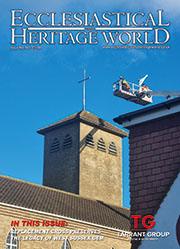The benefits of using the correct materials for traditional buildings
 by Paul Trace, Managing Director of Tuscan Foundry Products Ltd.
by Paul Trace, Managing Director of Tuscan Foundry Products Ltd.From North to South, East to West, the UK has approximately half a million Listed buildings. In addition there are numerous period properties dotted around the country in conservation areas and areas of outstanding natural beauty. These buildings form an important part of our countries history and provide a valuable insight into techniques and designs from years gone by.
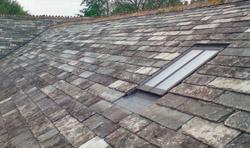 Organisations such as English Heritage exist to protect and promote England’s spectacular historic environment and ensure that its past is researched and understood. Supporting this work are the likes of SPAB; The Society for the Protection of Ancient Buildings which was founded by William Morris in 1877 to counteract the highly destructive ‘restoration’ of medieval buildings being practised by many Victorian architects.
Organisations such as English Heritage exist to protect and promote England’s spectacular historic environment and ensure that its past is researched and understood. Supporting this work are the likes of SPAB; The Society for the Protection of Ancient Buildings which was founded by William Morris in 1877 to counteract the highly destructive ‘restoration’ of medieval buildings being practised by many Victorian architects.Today SPAB is the largest, oldest and most technically expert national pressure group fighting to save old buildings from decay, demolition and damage. They represent the practical and positive side of conservation and have a firm set of principles about how old buildings should be repaired and the practical knowledge to show how these can be put into effect.
Their successes are visible across the country. Thousands of historic buildings survive which would have been lost, mutilated or badly repaired without their intervention.
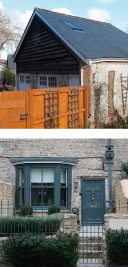 Yet for all these success stories there is still a growing number of period property owners ignoring the past and using inappropriate materials to renovate or refurbish buildings that have stood proud for decades. With budgets currently being squeezed by the economic downturn and an ever increasing range of ‘fake/effect’ products coming onto the market, there is a real risk of these buildings being stripped of the very materials that create their charm and character.
Yet for all these success stories there is still a growing number of period property owners ignoring the past and using inappropriate materials to renovate or refurbish buildings that have stood proud for decades. With budgets currently being squeezed by the economic downturn and an ever increasing range of ‘fake/effect’ products coming onto the market, there is a real risk of these buildings being stripped of the very materials that create their charm and character.Today, homeowners can choose from fake lead products, pre-fabricated chimneys, cast iron effect rainwater systems and modern bulky rooflights claiming a ‘conservation style’. With budgets tight these types of products are obviously tempting to period property owners, particularly as many of the manufacturers also claim that these modern materials even offer much coveted environmental benefits.
As Managing Director of Tuscan Foundry Products Limited, I have seen first hand an increase of plastic rainwater goods trying to emulate the benefits of cast iron. It is certainly true that today these alternative modern materials have made great advances from a few years ago but they still have a long way to go before offering anything like the benefits provided by cast iron. Reliable cast iron has proven its worth over the years in demanding applications; a historical track record unmatched by substitute materials.
A building contractor once said to me that ‘if plastic guttering had been available to the Victorians, they would have used it’. Whilst we will never know whether this might have been the case, we can be reasonably certain that it would not have stood the test of time in the way cast iron has.
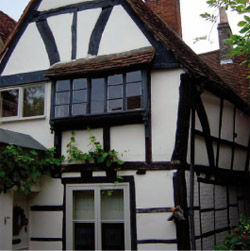 It appears the reason for using plastic over cast iron is firstly price and second that it does not require painting. This in itself contradicts the reason why many people choose a period property in the first place. I cannot think of a single customer who chose to own a period property because it was cheap or did not require any maintenance. These buildings have history, need care and are usually a labour of love for the owner.
It appears the reason for using plastic over cast iron is firstly price and second that it does not require painting. This in itself contradicts the reason why many people choose a period property in the first place. I cannot think of a single customer who chose to own a period property because it was cheap or did not require any maintenance. These buildings have history, need care and are usually a labour of love for the owner.The Listed Property Owners Club is an organisation helping Listed property owners to be kept informed about their rights and responsibilities. Membership gives access to detailed advice, information and support for just about every conceivable issue associated with ownership.
Director, Kellymarie Smith comments: ‘Many owners buy listed properties because they fall in love with the character of the building, they are also proud to own a little piece of our heritage. Most owners enjoy researching the history of their property and sharing its story making the property come alive. It’s very disappointing when owners replace original architectural items with modern materials which detract from the character, quite often it is a lack of knowledge on the owners part when they don’t realise the visual and sometimes detrimental damage they are doing to their building. We try to recommend owners think about the quality of the repairs and maintenance they are doing, rather than just looking at the price tag. It is also important for them to remember they will need to consult their conservation officer with changes such as the rainwater goods - if the builder says it’s ok owners should still get a 2nd opinion.’
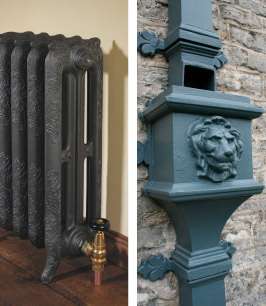 Membership of LPOC will help you avoid potentially expensive pitfalls, stay on the right side of your conservation officer and ensure that owning a listed building becomes less of a chore and more of a pleasure.
Membership of LPOC will help you avoid potentially expensive pitfalls, stay on the right side of your conservation officer and ensure that owning a listed building becomes less of a chore and more of a pleasure.There are many product manufacturers that have identified a potentially lucrative market in the refurbishment of older properties. They have taken existing products, designed for modern applications and pushed them as something they are not. A prime example is the conservation skylight, where low cost bulky framed rooflights that sit proud of the roof line have a plastic bar attached to the front to give a so called conservation effect. Unfortunately a large number of owners and building contractors are choosing this type of product over genuine conservation rooflights; based not on quality but price.
Whatever company you purchase your products from, it is important that you choose the right materials. When making decisions about whether to use modern alternatives you should remember those quirky period features that originally attracted you to the property. By choosing inappropriate materials you may save money in the short term but this could be at the expense of the original period character and ultimately reduce the value of the property.
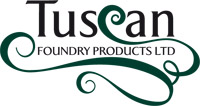 Useful contacts:
Useful contacts:Listed Property Owners Club Ltd Tel: 01795 844939 www.lpoc.co.uk
English Heritage Tel: 0870 333 1181 www.english-heritage.org.uk
SPAB Tel: 020 7377 1644 www.spab.org.uk










